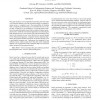Free Online Productivity Tools
i2Speak
i2Symbol
i2OCR
iTex2Img
iWeb2Print
iWeb2Shot
i2Type
iPdf2Split
iPdf2Merge
i2Bopomofo
i2Arabic
i2Style
i2Image
i2PDF
iLatex2Rtf
Sci2ools
104
Voted
ICASSP
2011
IEEE
2011
IEEE
Linear time decoding of real-field codes over high error rate channels
This paper proposes a novel algorithm for decoding real-field codes over erroneous channels, where the encoded message is corrupted by sparse errors, i.e., impulsive noise. The main problem of decoding such a corrupted encoded message is to reconstruct the error vector; recently, a common way to reconstruct it is to find the sparsest solution to an underdetermined system that is constructed using a paritycheck matrix. Unlike the conventional approaches reconstructing the high-dimensional error vector directly, the proposed method crossly recovers the elements of error vector from two (or several) groups of low-dimensional equations. Compared with the traditional algorithms, the proposed method can decode an encoded message with a much higher corruption rate. Furthermore, the complexity of our method is linear, which is much lower than those of the traditional methods. The experimental results verified the high error correction ability and speed of the proposed method.
Related Content
| Added | 21 Aug 2011 |
| Updated | 21 Aug 2011 |
| Type | Journal |
| Year | 2011 |
| Where | ICASSP |
| Authors | Zaixing He, Takahiro Ogawa, Miki Haseyama |
Comments (0)

